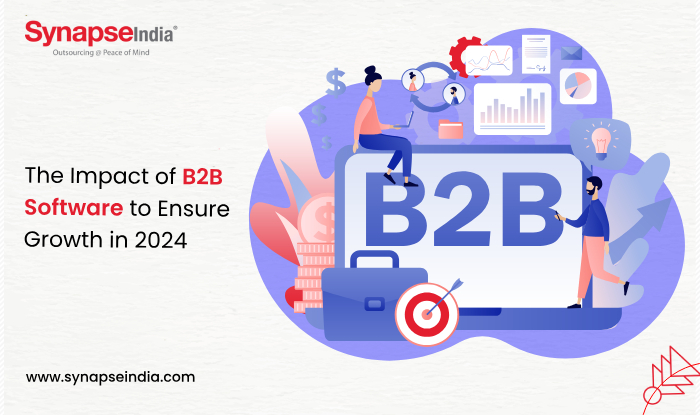 04 Nov 2024
04 Nov 2024“B2B software solutions support organizations to carry out various business processes with greater ease. Different B2B software types tailored to address specific business needs are optimizing efficiency across various operations.”

Software solutions are touching different aspects of businesses, allowing companies to carry out their operations more efficiently. B2B software is designed specifically to cater to the business needs of organizations, offering them cloud-based solutions. Organizations in different domains organizations are increasingly relying on B2B software solutions to optimize operations, streamline communication, enhance customer experience, and drive innovation. Properly implementing these solutions is the key for organizations to maintain a competitive edge within their industry.

With technological advancements becoming more prominent, B2B software has undergone significant changes over the past decade. With transformation being seen in technologies like cloud computing, artificial intelligence (AI), machine learning (ML), and others, B2B software solutions are now able to provide a more comprehensive, integrated approach to addressing business needs.
Many challenges of the traditional, siloed systems that lacked integration and led to inefficiencies, data duplication, and slower decision-making processes, are now becoming obsolete with the evolution of B2B software.
The increasing adoption of SaaS (Software as a Service) models has further fueled this transformation, allowing businesses to scale quickly and access sophisticated tools without significant upfront investments in infrastructure. This has made access to technology easier for everyone and even small and medium-sized enterprises (SMEs) are now leveraging B2B software solutions that were once reserved for large corporations.
There are various ways in which B2B software is contributing to business growth in 2024. The focus of this software has shifted from merely automating processes to driving business strategy, enabling faster innovation, fostering better collaboration, and providing data-driven insights that are crucial for sustained growth.
Let us have a look at the impact of B2B software on organizations that are driving growth and success for businesses in every sector.
B2B software can enhance operational efficiency by automating repetitive tasks, reducing manual errors, and accelerating processes through digital tools. This is also leading to streamlined workflows and enabling companies to allocate their resources more effectively and scale their operations without proportional increases in costs. Customer Relationship Management (CRM) solutions, Enterprise Resource Planning (ERP) systems, and Robotic Process Automation (RPA) tools are a few examples of B2B software that are enhancing efficiency and productivity in organizations.
B2B software can bring cost savings for organizations in multiple ways. Traditional software requires hefty upfront licensing fees and initial investment in its development, making it a costly affair. Since the B2B software solutions are offered on the cloud, it removes the need to install the software on every computer. Also, the infrastructure needed to maintain and upgrade these solutions is not required with B2b software. Both these factors contribute massively to cost savings. In addition to cost savings, this also brings peace of mind by eliminating the need to constantly monitor and monitor these solutions.
Many B2B software solutions are available in the form of subscription-based pricing which makes it easier for small businesses to afford these services without affecting their budget. The capital that would have been spent on initial investment in implementing traditional software can be put to better use. Moreover, B2B software solutions can be deployed faster compared to traditional software, allowing businesses to get started quickly.
Data has become the backbone of strategic decision-making in 2024. The ability to turn data into actionable insights is essential for businesses seeking to remain competitive. Different key areas of a company like sales, marketing, product development, and others can use these insights to drive innovation and growth.
B2B software solutions empower companies to collect, analyze, and act on vast amounts of data. They offer advanced analytics tools that enable businesses to extract insights from customer behaviors, operational trends, market patterns, etc. This can help businesses form better customer segmentation, perform targeted marketing, optimize supply chains, and make strategic decisions based on these activities.
Post-pandemic, the trend of remote work has increased remarkably. As a result, there has been a growing need for solutions that facilitate communication and collaboration. With collaborative platforms, teams can work together efficiently regardless of geographical location and B2B software provides an excellent platform for this. They help break down communication barriers and foster a more collaborative work environment.
By enabling smoother communication and collaboration, B2B software ensures that teams can respond quickly to challenges and opportunities, leading to faster problem-solving and innovation. They provide features such as file sharing, real-time messaging, project management, and task tracking, ensuring that employees can work seamlessly across departments and locations.
Scalability is another key advantage of B2B software, making it suitable for businesses that expect immense growth in the future. As companies expand their operations, enter new markets, and increase their customer base, scaling the business becomes vastly important to accommodate the changing needs. Normally, scaling the business would require significant infrastructure costs but with B2B solutions, scaling has become a lot easier.
Many modern B2B software solutions are cloud-based, meaning they can be scaled up or down depending on the needs of the business. They allow businesses to add new users, integrate additional tools, or access new features with minimal effort. Moreover, cloud-based B2B software can also support multiple languages and currencies, making global expansion more seamless.
Customer experience (CX) has become a major driver of growth in 2024. Using B2B tools, companies can better understand their customers’ preferences, pain points, and buying behaviors. This enables them to deliver personalized, efficient, and engaging experiences to their customers, which directly impacts customer satisfaction, retention, and loyalty. By leveraging B2B software to improve CX, companies can build long-term customer relationships that contribute to sustainable growth.
With the world becoming more and more digital, the risks of digital threats are also increasing. Under these circumstances, security and compliance have become top priorities for businesses. This has propelled the need for solutions that can help organizations reduce the risk of penalties and reputational damage. The use of B2B software solutions can help organizations maintain high levels of security while complying with regulatory requirements.
Implementation of B2B software can ensure robust data protection, secure cloud infrastructure, and compliance with data privacy regulations Many B2B solutions include built-in security features, such as encryption, multi-factor authentication, and real-time monitoring, to protect sensitive data from cyber threats. Furthermore, they also help businesses manage compliance.
B2B software solutions designed to cater to different aspects of business processes are making operations handling effortless. From project management to supply chain, accounting to human resources, different areas of businesses are benefitting from B2B software. Here are some common types of B2B software:

In 2024, the role of B2B software in ensuring growth has never been more vital. By offering multiple advantages, B2B software empowers businesses to adapt to the fast-evolving market landscape. As organizations continue to prioritize digital transformation, B2B software solutions will remain at the forefront of business strategy. Companies that leverage these tools effectively will not only streamline their operations but also position themselves for sustained growth in an increasingly competitive global market.

.png)
 16 Jan 2025
16 Jan 2025
